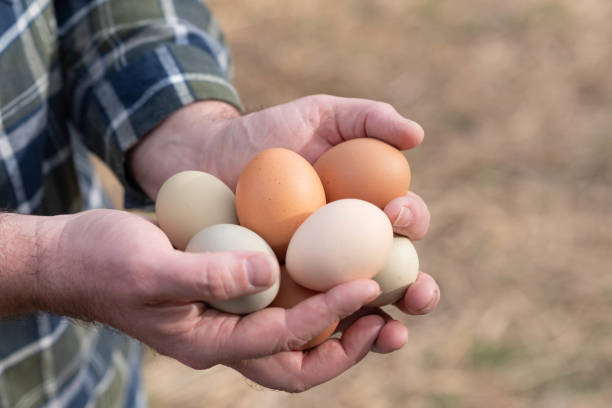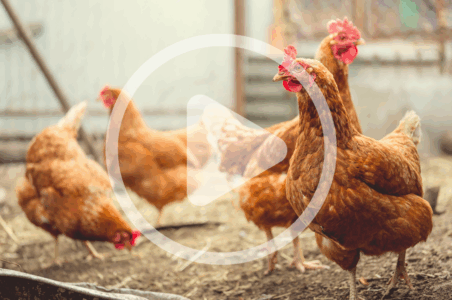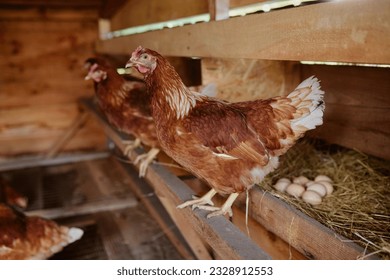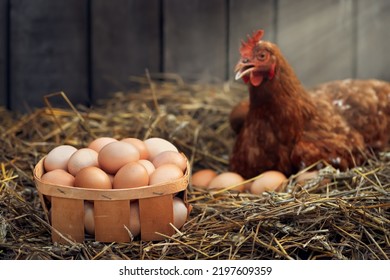
Backyard Chickens: Eggs-cellent Advice for a Healthier, Happier Homestead
Imagine collecting warm, freshly laid eggs from your own backyard every morning. The golden yolks promising a richer, more flavorful taste than anything you can buy at the store. This dream can become a reality! Backyard chickens are a fantastic addition to any homestead, providing fresh eggs, natural pest control, and enriching your soil. Whether you’re a seasoned homesteader or just starting your journey toward self-sufficiency, this beginner-friendly guide will walk you through everything you need to know to raise happy, healthy hens and enjoy a steady supply of delicious eggs. You'll discover practical, step-by-step advice for setting up your coop, choosing the right breeds, and providing the care your chickens need to thrive. Let's get started!

Section 1: Planning Your Coop and Run
A well-planned coop and run are essential for the health, safety, and happiness of your chickens. Consider it the foundation of your egg-laying adventure! Think of it as designing a comfortable and safe home for your feathered friends.
Coop Size & Design: When planning your coop, space is key. A good rule of thumb is to provide at least 4 square feet of space inside the coop per chicken and 8-10 square feet of outdoor run space. This allows your hens to move around comfortably and reduces stress. The coop should also have proper ventilation to prevent the buildup of moisture and ammonia, which can lead to respiratory problems. Nesting boxes are a must – one nesting box for every 4 hens is usually sufficient. Roosting bars, where chickens sleep, should be elevated off the ground and provide enough space for all your chickens to roost comfortably.
Run Considerations: A secure run is crucial for protecting your chickens from predators, such as foxes, raccoons, and hawks. The run should be fully enclosed with strong fencing that is buried at least 12 inches deep to prevent digging. Consider adding a roof to the run to provide shade and protection from the elements. The run should also provide ample space for your chickens to forage and dust bathe. Dust bathing is a natural behavior that helps chickens control parasites and keep their feathers clean.
Location, Location, Location: The location of your coop and run is also important. Choose a location that receives plenty of sunlight, which helps to keep the coop dry and warm. Ensure proper drainage to prevent muddy conditions. Ideally, the coop should be located within easy access of your house, but not too close. Chickens can be a bit noisy, and you don't want to be disturbed by their clucking all day long. Accessibility for cleaning and egg collection is also important.
DIY vs. Pre-Built: You have two main options: building your own coop or buying a pre-made one. Building your own coop allows you to customize it to your specific needs and preferences. It can also be a more affordable option, especially if you have some carpentry skills. However, building a coop can be time-consuming and require some planning and construction knowledge. Pre-made coops are a convenient option, especially for beginners. They come in a variety of sizes and styles, and they can be set up quickly and easily. However, pre-made coops can be more expensive than building your own, and they may not be as customizable. Check out our other Better Homes and Harvest posts about DIY projects for coop ideas!

Section 2: Choosing Your Chickens: Breeds and How to Source Them
Selecting the right chicken breeds is essential for a productive and healthy flock. Each breed has its own unique characteristics, so it's important to choose breeds that are well-suited to your climate, space, and egg-laying goals.
Egg-Laying Breeds: If your primary goal is to produce a lot of eggs, consider choosing egg-laying breeds such as Rhode Island Reds, Leghorns, Australorps, and Golden Comets. These breeds are known for their high egg production rates, often laying 250-300 eggs per year. Rhode Island Reds are hardy and adaptable, while Leghorns are known for their white eggs and efficient feed conversion. Australorps are dual purpose birds and lay brown eggs. Golden Comets are also brown egg layers, docile, and great for beginners.
Dual-Purpose Breeds: If you're interested in both eggs and meat, consider dual-purpose breeds such as Plymouth Rocks or Orpingtons. These breeds are good layers, but they also have a larger body size, making them suitable for meat production.
Sourcing Chicks: You can buy chicks from hatcheries, local breeders, or farm supply stores. Hatcheries offer a wide variety of breeds and can ship chicks directly to your door. However, it's important to research the reputation of the hatchery to ensure you're getting healthy chicks. Local breeders can provide more personalized service and may offer breeds that are better suited to your local climate. Farm supply stores are a convenient option, but the selection of breeds may be limited.
Brooding Setup: Before you bring your chicks home, you'll need to set up a brooder. A brooder is a warm, safe enclosure that provides chicks with everything they need to thrive. The brooder should include a heat lamp to keep the chicks warm, a waterer, a feeder, and bedding. The bedding should be absorbent and dust-free, such as pine shavings or straw. For a more in-depth guide, check out our detailed post on brooding chicks!

Section 3: Chicken Care: Feeding, Watering, and Health
Proper chicken care is vital for the well-being of your flock and the quality of their eggs. Just like any pet, chickens need proper food, water, and care to stay happy and healthy.
Feeding Your Flock: Providing a balanced diet is crucial for your chickens' health and egg production. Chicks need a chick starter feed, which is higher in protein to support their rapid growth. As the chicks grow into pullets (young hens), switch them to a grower feed. Once your hens start laying eggs (around 6 months old), switch them to a layer feed, which is higher in calcium to support eggshell formation. Grit, small pieces of rock or shell, helps chickens digest their food. Calcium supplementation, such as oyster shells, is also important for laying hens to ensure strong eggshells.
Watering: Fresh, clean water is essential for your chickens' health. You should provide water at all times, and the waterer should be cleaned regularly to prevent the buildup of algae and bacteria. During the winter, you'll need to take steps to prevent the water from freezing. There are heated waterers available, or you can simply change the water frequently throughout the day.
Health Considerations: Chickens are susceptible to a variety of diseases and parasites. Common problems include mites, lice, and coccidiosis. Regular health checks and preventative measures can help to keep your flock healthy. Look out for signs of illness like lethargy, diarrhea, and decreased egg production. Organic pest control methods, such as diatomaceous earth, can be used to control mites and lice. When in doubt, always consult with a veterinarian.
Treats and Enrichment: Treats can be a fun way to supplement your chickens' diet and provide them with enrichment. Safe and healthy treats include vegetable scraps, mealworms, and fruits. However, treats should only be given in moderation, as too many treats can disrupt the balance of their diet. Enrichment activities, such as dust baths, perches, and mirrors, can help to prevent boredom and feather picking. A bored chicken can be a destructive chicken!

Section 4: Egg Collection and Care
Collecting fresh eggs from your backyard is one of the most rewarding parts of raising chickens. Knowing how to properly collect and care for your eggs ensures that you have safe and delicious eggs to enjoy.
When to Start Collecting: Hens typically start laying eggs around 6 months old, but this can vary depending on the breed and individual chicken. The first eggs may be smaller and less frequent, but egg production will gradually increase as the hen matures. Season, breed, and overall health can also impact egg production.
Collecting Eggs Regularly: Collect eggs daily, especially in hot or cold weather. This helps to prevent breakage and contamination. Eggs that are left in the coop for too long can also become attractive to predators.
Cleaning and Storing Eggs: There are different methods for cleaning eggs. Some people prefer to dry brush the eggs to remove dirt and debris, while others wash them with water. Washing eggs can remove the protective bloom, a natural coating that helps to prevent bacteria from entering the egg. If you wash your eggs, be sure to refrigerate them immediately. Unwashed eggs can be stored at room temperature for several weeks.
Dealing with Imperfect Eggs: Occasionally, you may find cracked, dirty, or double-yolked eggs. Cracked eggs should be discarded to prevent contamination. Dirty eggs can be cleaned as described above. Double-yolked eggs are perfectly safe to eat, and they are often considered a lucky find!

Conclusion: Reflecting on the Rewards
Raising backyard chickens offers a wealth of rewards, from the simple pleasure of collecting fresh eggs to the satisfaction of connecting with nature and embracing a more sustainable lifestyle. It's a journey filled with learning, joy, and delicious rewards. We hope this guide has empowered you to embark on your own backyard chicken adventure! The benefits of raising backyard chickens extends beyond the fresh eggs. They are natural pest controllers, feasting on insects and weeds in your garden. Chicken manure is also an excellent source of fertilizer, enriching your soil and promoting healthy plant growth.
As the days get longer, and spring approaches, now is the perfect time to plan your backyard chicken adventure!
![omelet fresh eggs herbs garden]
Ready to get started? Share your coop plans or questions in the comments below! We love hearing from our community of homesteaders. Have backyard chickens already? Share your favorite breed and egg-laying tips! Check out our other posts on [link to another post on building a chicken coop] and [link to a post on organic pest control]. Sign up for our newsletter for more homesteading tips and seasonal inspiration!